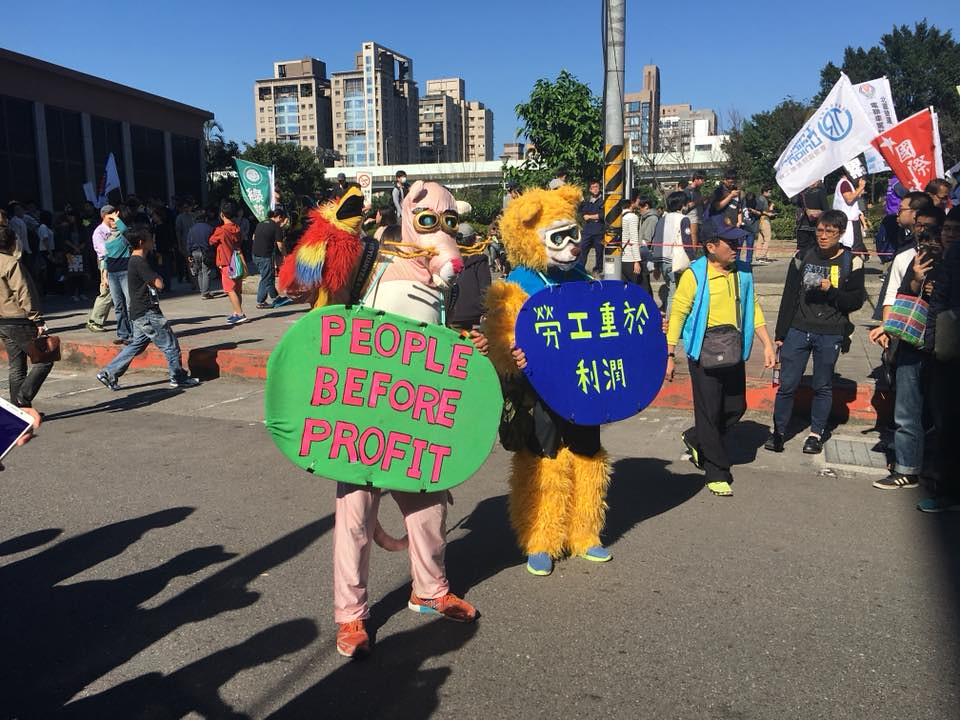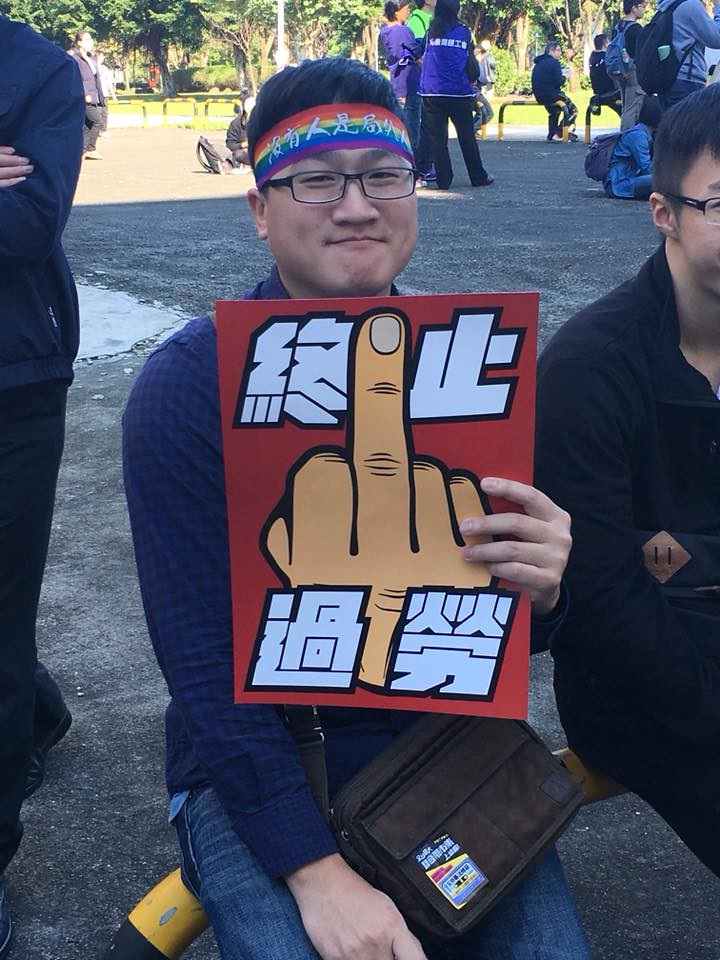
As you've no doubt heard if you follow Taiwan news at all,
At the core of their demands were that more pilots be assigned to longer flights, so that total working hours for pilots could be brought down to a reasonable standard that would not leave them overworked and overtired. It also prioritized hiring Taiwanese pilots (including foreign pilots residing in Taiwan) over foreign pilots.
I have no particular opinion about the latter demand, but the former is simply reasonable. Nobody wants an overworked pilot; that's how disasters happen, and let's not forget that until very recently China Airlines had a poor safety record (in recent years things seem to have improved). Although China Airlines says its safety and working hour policies are within international standards, considering said safety record and how overtired pilots can be a factor in plane crashes, I question this.
Besides, it's simply not that culturally ingrained in Taiwan to strike at a particularly busy time for your employer (the strike began over Lunar New Year, one of the busiest travel times in Asia), especially if better compensation is not the employees' core demand. To take an action like this, the pilots themselves must have known that overwork and lack of sufficient cockpit crew was a major issue. The only real rebuttals to these demands were, essentially, "but that would cost money!" (yeah, a safe work and customer environment usually does) and "but we'll lose passengers!" (yup, but you'll lose more if there's a major crash and people will die), which underscores how strong a case the pilots made.
The thing is, this kind of strike has been a fairly rare phenomenon in Taiwan, especially in earlier decades. Up through the 1980s, generally pro-business, anti-labor laws governing collective action made strikes difficult if not impossible (not surprising given the repressive Martial Law political atmosphere more generally), and even in the 1990s, despite some strikes taking place, "legitimate union strikes" were still rare, and difficult to legally carry through. Although strikes have become more politically possible since then, they're still fairly rare, with an exception being the China Airlines flight attendant strike in 2016. (That the ground zero for highly-publicized strikes seems to be China Airlines also points to an anti-labor bent to their workplace culture).
The lack of strikes in previous decades wasn't just about anti-worker labor laws - there is an overall lack of a strong labor movement in Taiwan for a number of reasons. There are surely some cultural reasons for this (think of stereotypical "East Asian" work culture which values hierarchy and collectivism; there's a kernel of truth to it, although Taiwan is certainly more chilled-out than South Korea or Japan in this way).
But, more importantly, it's the result of an intentional political attempt to keep labor from organizing so as to advocate for its own needs. This has been done in a very devious way: not by union-busting or trying to dissuade workers from organizing, but by preemptively creating worker "unions" and "trade associations" that employees in a company or industry may belong to, so as to create the veneer of organized labor, but which is ultimately controlled by the companies or government, not the workers themselves. Such organizations have typically represented the best interests not of the workers but of management (or the government) and did not necessarily take on labor advocacy at all. In fact, what "management" and "the government" might want were not always different, given the history of nationalized industries / state-owned enterprises in Taiwan and how government control of industry and labor was used as a tool for political repression.
Of course, as independent labor movements coalesced, these came into conflict with the old-style "unions", there were disagreements on whether to improve the lot of labor overall or to address specific needs of specific groups of workers and...it's all very complex but essentially, that's the reason why not every political party, group and organization which claims to represent the interests of "labor" is on the same page, or even gets along. For more on this point I recommend Yubin Chiu's chapter on trade union movements in Taiwan's Social Movements under Ma Ying-jeou (I'm sorry that it will probably cost you $50 to buy the book if you wish to do so, though that's better than the earlier price of $150 - and although Chiu obviously comes from a Marxist viewpoint on labor issues, he's good at explaining the fundamentals and historical complexities of trade unionism in Taiwan).
Under such conditions, it's not surprising that the labor movement has not been particularly robust and strikes have been fairly rare in Taiwan.
Anyway, taking all of this together, Taiwan simply needs more strikes.
First, because the typical Westerner's idea of a "strike" seems to involve the workers demanding better compensation. An anti-union libertarian friend of mine has even said that he imagines that only mediocre workers support collective bargaining, because the most talented employees have a strong position from which to negotiate better remuneration - it's only the employees who are not particularly distinguished who need to rely on collective action to improve pay and benefits.
That's wrong for a number of reasons, most notably that it assumes that all collective bargaining is aimed at better compensation for each individual rather than improved working conditions for everyone as a collective whole (it also assumes that more valuable workers don't care about whether their less-highly-performing coworkers are compensated fairly, which isn't always true.) But the flight attendants' and pilots' strikes show that this simply isn't that common a motivation in Taiwan: although compensation played a minor role in these actions, the crux of what the workers in both cases were demanding had to do with overwork and general working conditions.
Although I also support strikes for better collective compensation, there's a moral high ground to striking so that you can do your job better, not just to get more "stuff". Salaries in Taiwan are quite low and organized labor has not made any strong moves to push for better pay overall. There are a lot of hurdles for labor to jump simply in terms of social awareness of this issue: it's still taken as normal that one cannot challenge one's boss; changing jobs more often to garner wage increases rather than asking for a raise at one's current job is still seen as a good strategy; and it's still quite common for workers to defend long hours in the office because they prioritize making more money over having more personal time (even though one could argue that workers deserve both reasonable pay and reasonable hours, the rejoinder is that if management won't even give workers one of these two things, it's unrealistic to expect both).
Of all the good reasons to strike, strikes in Taiwan seem to happen for the best possible reasons. So, more strikes please.
Second, given the cultural and historical reasons outlined above, there's no reason to believe that Taiwan's economy or infrastructure will grind to a halt (as seems to happen regularly in France) due to a large number of strikes. Despite the two prominent China Airlines strikes, they are still seen as a last-ditch strategy by labor unions that have only fairly recently coalesced outside of management control. Without a strong history of striking, it's unlikely to become a popular or even particularly common strategy. I don't foresee any sort of slippery slope here where there's a strike every few weeks over every little issue.
And if workers feel that their complaints are valid enough, and their conditions urgent enough, that this 'last ditch' strategy is necessary, there's probably a good reason for that. More strikes please!
Even if there were a slide into strikes taking place over a greater variety of issues - pay, sex discrimination in the workplace or the gender pay gap (still real problems in Taiwan), long hours - this would overall be a good thing for Taiwan. These are intractable issues that have been allowed to fester. Employers in Taiwan have taken the attitude that "I hired you and pay you, so you have to do everything I ask of you exactly when I ask for it, even if I take up all of your free time and I will take it as a personal affront and loss of face if you challenge me in any way on this or even attempt to discuss your working conditions" for too long. Labor standards are a joke. If strikes are what it takes for management to wake up to the fact that their employees are not their chattel, then more strikes please!
Working conditions, culture and compensation have been problems entrenched in Taiwanese society for far too long, and have arguably hindered Taiwan's economic development overall, as it loses its Millenial generation to better career opportunities, pay and working conditions overseas. Greater labor organization that is not under management control will become easier to attain as workers take stronger collective action, and will be the final step to eradicating the old government/management collusion which has been both historically politically repressive and anti-worker. It has the potential to bring various social movements together (see the image above).
Yet strikes are not likely to become yet another entrenched problem in Taiwanese society given how they are already typically viewed as an action that ought not to be commonly taken.
To put it simply, Taiwan needs more strikes.


No comments:
Post a Comment